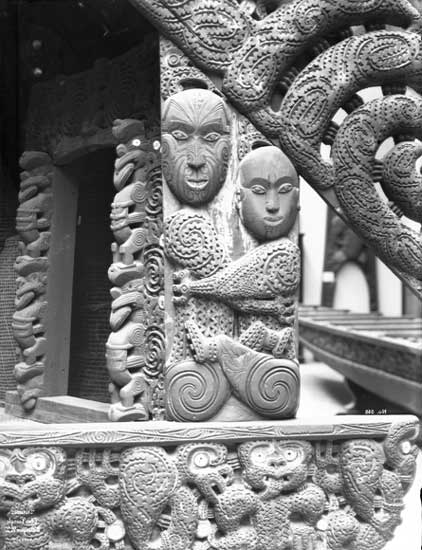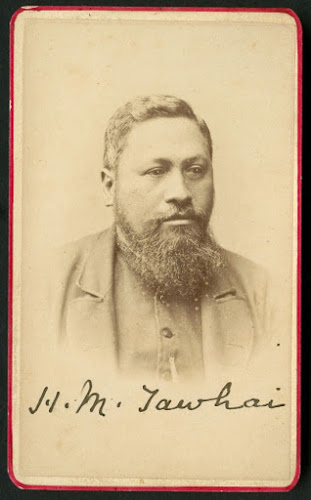Crime and Punishment: Early Maori and Aboriginal Views on British Justice
What I find interesting is that, at a time in the early nineteenth century when many British believed themselves responsible for bringing enlightenment and liberty to ‘primitive’ native peoples, many of the targets of their supposed benevolence were capable of powerful critiques of what was being offered them. Maori exposed to the British judicial system at Sydney or elsewhere sometimes condemned it as cruel and arbitrary. The missionary William Yate wrote in his Account of New Zealand (1835) that:
The punishments of the New Zealanders are not commonly severe. They strongly reprobate the punishments adopted by the white people, as extremely cruel. Theft, if persevered in, is sometimes visited with a severe blow from a stick or paddle across the head; — the breach of a tapu, with the loss of property; — cursing, with the same punishment; — adultery, with death. The exclaim loudly against our method of executing criminals; first telling them they are to die; then letting them lie for days and nights in prison, to think over what is to happen to them; and then leading them slowly to the gallows, and keeping them waiting some time at the foot of it, before they are hanged. “This,” when we upbraid them with cruelty, “this,” say they, “is more cruel than any thing we do.
William Yate, An Account of New Zealand and of the Church Missionary Society’s Mission in the Northern Island, London: R. B. Seeley and W. Burnside, 1835, pp.104-05.
Yate’s description of the general Maori attitude towards British forms of punishment is borne out by a much earlier incident that I describe in The Meeting Place: Maori and Pakeha Encounters, 1642-1840.
 |
| William Yate, www.teara.govt.nz |
There, I discuss the important visit of northern rangatira Te Pahi to Port Jackson in 1805. While Te Pahi’s trip was an important one, resulting in close bonds being forged with Governor Philip Gidley King, the chief’s experience of British justice in the colony left him angry and appalled. As King described the story:
Two soldiers and a convict were sent prisoners from Port Dalrymple to be tried by a Criminal Court for stealing some pork from the King’s stores at that place. Tip-a-he attended their trial on the Friday, and one of them was ordered for execution on the following Monday. As is usual, they attended Divine service on the Sunday. As everyone was much affected at their situation, Tip-a-he was not wanting in commiseration; but the instant the service was ended he went to the criminals and embracing them accompanied them back to the jail, where it appeared they gave Tip-a-he a petition to present to me. On returning to Government House he came into the room where I was writing, and in a very earnest manner, and I believe from the full force of conviction, he endeavoured to reason with me on the injustice of slaying men for stealing pork, and at the same time shewing the severest sorrow and grief for their fate, which he concluded by taking the petition out of his pocket and giving it to me, at the same time shedding tears. He threw himself prostrate on the ground, sobbing most bitterly. Observing that I did not give him any answer or hopes than by saying I should consider of it he left the room and did not make his reappearance until the hour of dinner, having taken off the dress he had made here, and appeared very violent, exclaiming in most furious manner against the severity of our laws in sentencing a man to die for stealing pork, although he admitted that a man might very justly be put to death for stealing a piece of iron, as that was of a permanent use; but stealing a piece of pork which, to use his own expression, was eat and passed off, he considered as sanguine [i.e., bloodthirsty] in the extreme. With much earnestness he urged his being allowed to take them to New Zealand, where taking provisions was not accounted a crime; and so earnest was he on this expedient that he went to the master of an American vessel, then lying here, to request he would take them to New Zealand, where his ship would be loaded with potatoes as a recompense for their passage. During the three days that the fate of these criminals were pending Tip-a-he would take no nourishment whatever, and in several instances was inclined to be very furious. However, on its being signified that two were forgiven and that neither of the others would be executed at Sydney, he came about by degrees, but would never be reconciled to the idea of men suffering death for taking wherewithal to eat — a natural reasoning for one who inhabits a country where everything of that kind is common, and where their other wants are but few.
Robert McNab (ed.), Historical Records of New Zealand, 2 vols, Wellington: Government Printer, 1908, vol.1, pp.264-65.
From Te Pahi’s perspective, if a person was hungry the appropriate response was to feed them. The British decision to execute a man simply because he had helped himself to food was seen as nothing short of cruel and barbaric (a reaction which serves as a reminder of the much less hierarchical nature of Maori society at this time — resources were for distribution, not to be hoarded by a wealthy elite).
 |
| Te Pahi, www.treaty2u.govt.nz |
It is interesting to note that many Aborigines responded similarly to British forms of punishment. Inga Clendinnen writes in her excellent book Dancing With Strangers of scenes in which Aboriginal groups summoned to witness the flogging of convicts in punishment for some crime or other (often committed against the Aborigines in question) also broke down in tears and pleaded with the governor to put a stop to it, or else tried to do so themselves. As Clendinnen says, where the British ‘saw right order made visible, with God and King behind whipping post and gibbet, the Australians saw disgusting, wanton cruelty.’ The irony is that the British increasingly came to view Australian Aborigines as belonging to the very bottom rung when it came to a racial hierarchy of peoples (the English, of course, occupying the top spot).
 |
| Bungaree, A Native of New South Wales, National Library of Australia |
Alan Ward’s A Show of Justice: Racial ‘Amalgamation’ in the Nineteenth Century (1974) remains the best work on later Maori responses to the legal system (and, for the twentieth century, see the two books by Richard Hill). I have also written about nineteenth-century Maori responses to English law. Here is a link to a paper entitled ‘English Law and the Maori Response: A Case Study from the Runanga System in Northland, 1861-65’. Henry Reynolds and others have explored the story of Australian Aboriginal engagement with the law.



Comments
Post a Comment